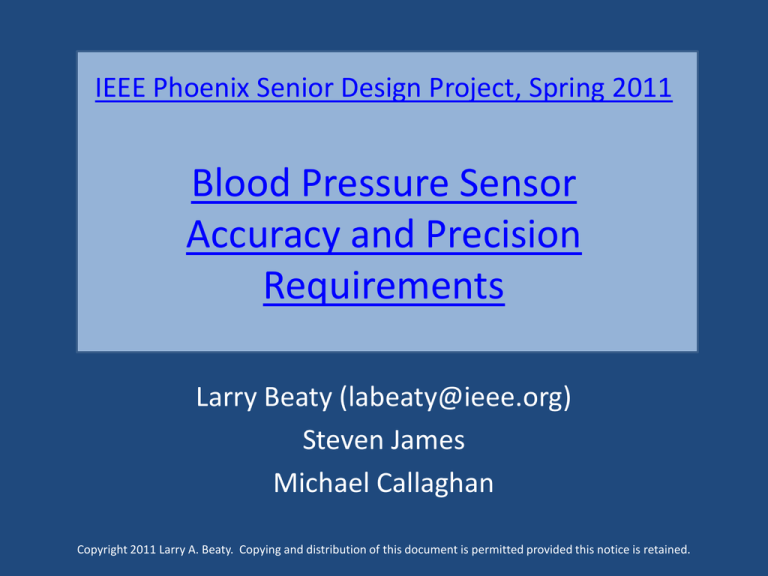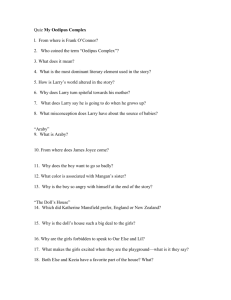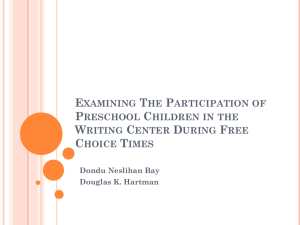IEEE Phoenix Senior Design Project, Spring 2011 Blood Pressure
advertisement

IEEE Phoenix Senior Design Project, Spring 2011 Blood Pressure Sensor Accuracy and Precision Requirements Larry Beaty (labeaty@ieee.org) Steven James Michael Callaghan Copyright 2011 Larry A. Beaty. Copying and distribution of this document is permitted provided this notice is retained. Who Are We? • Twin Cities IEEE Phoenix Project – Volunteer electrical/mechanical/software engineers – Our group was assembled to productize results of research done at the Chronobiology Lab and elsewhere – Open Source hardware project to design and build a blood pressure monitor that is inexpensive, unobtrusive, easy to use and collects a week of blood pressure measurements. • UMN Halberg Chronobiology Lab – Dr. Franz Halberg, “Father of American Chronobiology” – Chronobiological Interpretation of Blood Pressure • Vascular Variability Disorders more important than hypertension – Our “customer” Copyright 2011 Larry A. Beaty. Copying and distribution of this document is permitted provided this notice is retained. Background The Sphygmochron Report Results from Continuous Monitoring Copyright 2011 Larry A. Beaty. Copying and distribution of this document is permitted provided this notice is retained. Background The Sphygmochron Report Results from Continuous Monitoring Copyright 2011 Larry A. Beaty. Copying and distribution of this document is permitted provided this notice is retained. Where the student project fits in • Over-Simplified Block Diagram of the System Sensor Data acquisition and communication Cell phone or home computer Data storage and analysis website Copyright 2011 Larry A. Beaty. Copying and distribution of this document is permitted provided this notice is retained. What is Pulse Transit Time (PTT)? • The heart beats every 1 second or so • It takes a couple of hundred milliseconds for a pulse to travel (transit) from the heart to extremities • The pulse’s velocity is related to blood pressure (and other things such as compliance of the artery) • Also called Pulse Wave Velocity (PWV) • In theory, you put two pulse sensors along an artery, calculate the transit time (velocity), then derive the blood pressure. Copyright 2011 Larry A. Beaty. Copying and distribution of this document is permitted provided this notice is retained. Activities in the sensor project • Understand and describe the supplied pulse model, and derive expected transit times and accuracy. • Develop requirements and an error budget for a sensor system to record the shape of individual pulses at two locations on the body to determine adequate blood pressure readings. • Design, build, and test a non-invasive sensor system to record pulse waveforms at two locations on the body (e.g. forearm and wrist). • Publish a final report that will be posted on the Phoenix Project website. (Can be the same as your class report.) • Additional “stretch goals” available Copyright 2011 Larry A. Beaty. Copying and distribution of this document is permitted provided this notice is retained. Sensor Technologies to choose from • • • • • Piezoelectric Infrared optoelectronic Acoustic (sound/microphone) Impedence Plethysmography Your ideas??? – Anything that can detect a pulse might be viable – Only one good sensor idea is needed for your project Copyright 2011 Larry A. Beaty. Copying and distribution of this document is permitted provided this notice is retained. Resources • We work in the IEEE student lab (Keller Hall, 2110) • In-the-lab or on-Skype meetings on Saturdays 10:00 to 1:00 • We have worked with students before • Equipment in our lab on campus • Academic papers (or do your own searches) • Previous student projects Copyright 2011 Larry A. Beaty. Copying and distribution of this document is permitted provided this notice is retained. Examples of previous projects Copyright 2011 Larry A. Beaty. Copying and distribution of this document is permitted provided this notice is retained. Examples of previous projects Copyright 2011 Larry A. Beaty. Copying and distribution of this document is permitted provided this notice is retained. Examples of previous projects Copyright 2011 Larry A. Beaty. Copying and distribution of this document is permitted provided this notice is retained. Examples of previous projects Copyright 2011 Larry A. Beaty. Copying and distribution of this document is permitted provided this notice is retained. Examples of previous projects Copyright 2011 Larry A. Beaty. Copying and distribution of this document is permitted provided this notice is retained. Examples of previous projects Copyright 2011 Larry A. Beaty. Copying and distribution of this document is permitted provided this notice is retained. Conclusion • We are looking to extend the R&D we’ve done so far, and then productize something from the ongoing research; the student projects are an important part of that. • Dr. Halberg expects this to change healthcare in a major way for all 7 billion people on the planet by preventing and diagnosing diseases we can’t detect today. • Would you like to say that you got an “A” for doing your part on an open source healthcare-related project that went from visualization in the academic world to R&D and then to production? – Companies like to hire people who can say stuff like that! Copyright 2011 Larry A. Beaty. Copying and distribution of this document is permitted provided this notice is retained.


